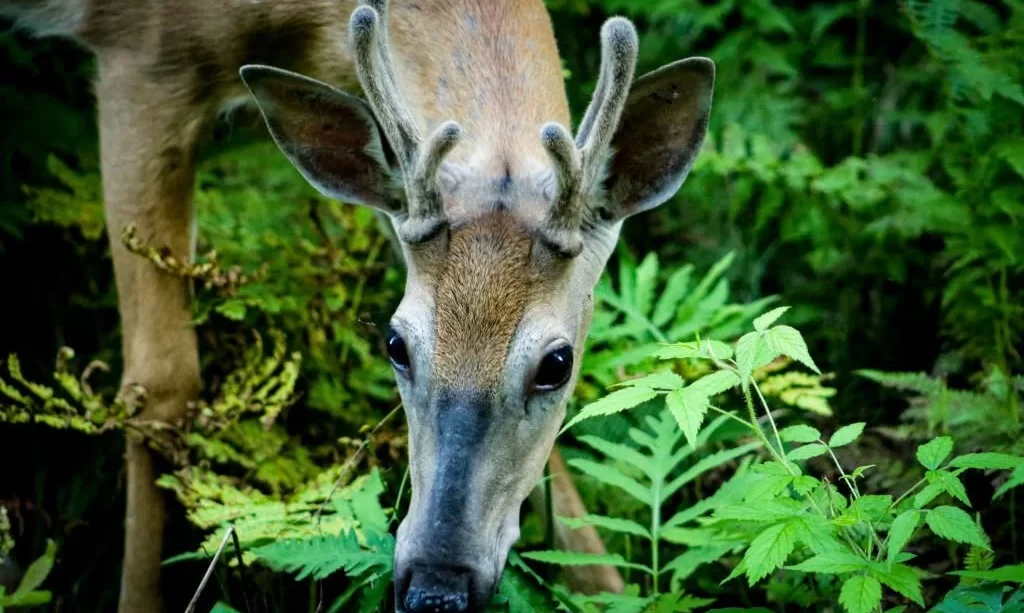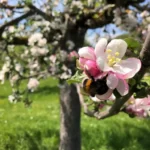Gardening is a pursuit that brings joy to many, offering an opportunity to cultivate and nurture a variety of plants, from colorful flowers to flavorful herbs. However, there’s a common challenge that gardeners often face – the presence of deer. These graceful yet voracious herbivores can turn a lush garden into a buffet, leaving gardeners to wonder which plants might be on the menu. Among the culinary herbs that grace our gardens, basil, with its fragrant leaves and versatility in the kitchen, holds a special place. But do deer share our appreciation for this aromatic herb?
In this article, we embark on a journey to explore the eating habits of deer, with a particular focus on the tantalizing question: Do deer eat basil? Understanding the dietary preferences of these wildlife neighbors is not only fascinating but also crucial for protecting our beloved plants. We will delve into the habits of deer when it comes to foraging for food and investigate whether basil finds a place on their menu. Along the way, we’ll uncover strategies to safeguard basil and other garden treasures from the curious appetites of these graceful but often troublesome visitors.
Deer Feeding Habits
Deer, those elegant creatures that roam the fringes of woodlands and make occasional forays into our gardens, are known for their herbivorous nature. These browsers have a varied diet that primarily consists of plant material. To understand whether they have a taste for basil, it’s essential to delve into the intricacies of their feeding habits.
Deer’s dietary choices can vary significantly depending on several factors, including the season, the availability of natural forage, and the specific plant species in their environment. Generally, deer feed on a wide range of vegetation, including grasses, leaves, twigs, and the tender shoots of shrubs and trees. They are opportunistic feeders, adapting their diet to what’s readily accessible in their surroundings.
In times when natural forage is abundant, such as during spring and summer, deer may primarily graze on native plants and grasses. However, when resources become scarce during fall and winter, they may venture into cultivated areas, including gardens, in search of nourishment.
To ascertain whether basil is a tempting treat for deer, we must consider these factors that influence their dietary preferences and examine evidence from gardeners who have witnessed deer interactions with this beloved herb.
Basil as a Garden Plant
Before diving into the intriguing question of whether deer eat basil, it’s essential to establish basil’s significance as a garden plant. Basil, known scientifically as Ocimum basilicum, is not only renowned for its culinary uses but also cherished for its aromatic leaves and attractive appearance.
Basil comes in various varieties, each with its unique flavor profile and culinary applications. Common types include sweet basil, which is a staple in Italian cuisine and prized for its aromatic, licorice-like scent, Thai basil, which adds a distinct peppery flavor to Asian dishes, and lemon basil, which imparts a refreshing citrusy note to culinary creations.
As a garden plant, basil thrives in warm, sunny conditions and well-drained soil. Its lush, green leaves make it an appealing addition to herb gardens, vegetable plots, and even container gardens. Gardeners appreciate basil not only for its culinary versatility but also for its potential to deter certain insect pests due to its aromatic oils.
- MADE IN THE USA & 100% TO GROW: All Back to the Roots Indoor Gardening Kits are backed by our 100% to Grow promise – if your kit doesn’t grow as described, we’ll replace it or provide a refund. We’re a small team based in Oakland, CA that’s committed to helping you grow.
- EVERYTHING INCLUDED TO GROW: Each Kitchen Herb Garden comes with organic plant-based soil, organic seeds, moisture-balancing biochar, & access to a free online STEM curriculum for kids. All you have to do is add sun & water. No chemicals, no transplanting, and no messy drainage holes.
- GREAT GIFT: The Kitchen Herb Garden has been ranked among the year’s top Gardening Gifts, Teachers Gifts, and Unique Gifts. It comes READY TO GIFT in beautiful packaging & will be sure to be THE gift of the year. Go ahead and treat yourself or a loved one today
- THE EASIEST WAY TO START A WINDOWSILL GARDEN: Growing your own fresh herbs at home has never been easier. With the new Back to the Roots Kitchen Herb Garden, you’ll be able to grow organic basil, cilantro, and mint right out of the can, year ‘round — no transplanting needed
- GROWS YEAR ROUND: Our cans are designed for indoor spaces, so you can have fresh herbs growing year ’round in any season – Spring, Summer, Fall or Winter
Do Deer Eat Basil? The Evidence
The question of whether deer indulge in basil has piqued the curiosity of gardeners and enthusiasts. While basil is not typically at the top of the list of deer-preferred foods, anecdotal evidence suggests that deer may occasionally sample basil leaves if other food sources are scarce or if they are particularly curious.
Reports from gardeners who have encountered deer in their gardens describe instances where these creatures have browsed on basil plants. However, such occurrences may not be common, and the extent of damage can vary. Factors like the local deer population, the availability of natural forage, and the time of year can influence whether deer choose basil as a snack.
It’s worth noting that deer are known to have individual preferences and behaviors, and their dietary choices can vary. Some gardeners may find that deer leave their basil plants untouched, while others may experience occasional nibbling.
To mitigate the potential impact of deer on basil and other garden plants, gardeners often employ various protective measures, such as fencing, deer repellents, and companion planting. These strategies can help deter deer and safeguard the garden’s bounty.
Protecting Basil from Deer: Strategies and Tips
Safeguarding your basil and other garden plants from the inquisitive appetites of deer requires thoughtful strategies and proactive measures. Here are some effective tips and approaches to consider:
- Fencing: Installing a deer-resistant fence around your garden can be one of the most reliable methods to keep deer at bay. Choose fencing that is at least 8 feet tall, as deer are skilled jumpers. Electric fencing can also be an effective deterrent.
- Deer-Resistant Plants: Incorporate deer-resistant plants in your garden alongside basil. These are species that are less appealing to deer and can serve as a buffer. Examples include lavender, rosemary, and marigolds.
- Deer Repellents: There are commercial deer repellents available that can deter deer from approaching your plants. These products typically have strong scents or tastes that deer find unpleasant. Reapply as directed for best results.
- Companion Planting: Planting basil alongside deer-repelling companion plants can help protect your herb. For instance, interplanting basil with garlic or onions may help deter deer.
- Motion-Activated Sprinklers: Motion-activated sprinkler systems can startle deer with a sudden burst of water, discouraging them from entering your garden.
- Scare Tactics: Consider using scare tactics like hanging wind chimes, aluminum foil strips, or even placing garden ornaments that move in the wind. These visual and auditory deterrents can make deer uncomfortable in your garden.
- Gardening in Containers: If deer are a persistent problem, you might opt to grow basil in containers placed on decks or patios where deer can’t access them.
- Regular Monitoring: Keep an eye on your garden for signs of deer activity, such as tracks and nibbled plants. Taking swift action when deer are spotted can help prevent significant damage.
- Tough durable deer netting; Protects landscape and crops from deer and other animals
- Economical, lightweight deer protection; Black UV-resistant deer netting
- Reusable mesh deer fence; Stops deer and other animals from eating shrubs, berries, and vegetables
- Easy to use roll of deer fence netting; Attaches easily to posts and trees
- Do it yourself deer netting for protecting trees, shrubs, orchards and crops
Conclusion
In conclusion, the question of whether deer eat basil reveals the intriguing dynamics of nature in our gardens. While basil is not a deer’s first choice, they may occasionally sample its leaves, especially when other food sources are limited. Gardeners who cherish their basil plants often find creative and effective ways to protect them from these gentle yet voracious herbivores.
By understanding deer feeding habits, recognizing the value of basil as a garden plant, and implementing protective strategies like fencing, repellents, and companion planting, gardeners can strike a balance between cultivating their beloved herbs and coexisting with local wildlife.
As you tend to your basil plants and other garden treasures, remember that a harmonious relationship with nature can be achieved through thoughtful planning and a dash of creativity. While deer may visit your garden from time to time, your basil can continue to flourish and grace your culinary creations.






